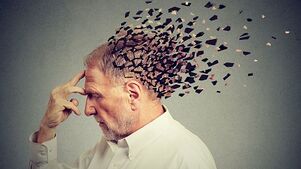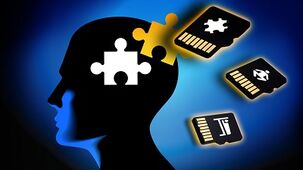
There are conflicting opinions about medications to improve memory. Some say that it is useful and helps to cope with increasing intellectual stress, it really helps and is effective.
Others say that this is just a myth, that it is useless to take such drugs, and that they can even be harmful and addictive. Try to look at both views in more detail and understand who is right.
a bit about memory
Memory is a mental function of higher neural activity that occurs by collecting, storing, and reproducing previously received information. Memory allows you to store information for a long time about the reaction of the outside world or the body to any impact, and at the same time allows you to use this information for the proper organization of activities in the future.
Memory includes various but related processes.
- Memory- input of new information, sensations.
- Storage- involves the collection, processing and assimilation of information and emotions. This process allows a person to learn, develop thinking and speech.
- reproduction and recognition- actualization of elements, actions, feelings of the past. Reproduction is involuntary (the elements "float" in a person's mind without his will and effort) and are arbitrary.
- Forget- loss of the ability to reproduce and recognize previously memorized elements. It can be temporary or permanent. There is incomplete forgetfulness when information is multiplied or recognized by mistake or in part.
Basic memory types
There are many types and subtypes in the memory classification. Let's talk about the main types.
- Sensory memory- to protect the senses after stimulating the information.
- Touch memory- protection of information from receptors as a result of touch.
- Engine Memory- By saving movement information, many can automatically remember the actions they performed.
- Semantic memory- save information about learned stories, dates, multiplication tables, for example, facts.
- Short-term memory- save information for a short time. It has a small volume.
- Long-term memory- permanent storage of information, including life.
Memory Laws

Few people know that memory has a number of laws. These are not the author's inventions, but scientifically constructed and proven real-life examples.
- Law of Repetition- information is better remembered if it is repeated several times.
- Interest Law- If a person is interested in information, he will remember it faster and better.
- External Law- the information given at the beginning and end is best remembered.
- Law of Understanding- if the information is deeply understood, it will be better remembered.
- The law of optimal line length- the amount of memorized information should not exceed the amount of short-term memory.
- Installation Law- a person who has given himself an installation that needs to remember this or that information will remember it faster and better.
- Law of Inhibition- when memorizing similar concepts, old information "coincides" with new.
- Context Law- goes faster when you memorize things that can be related to already familiar concepts.
- Act of Act- memorization is more efficient and faster if what is memorized is used in practice.
These laws can be used if you want to remember something faster and better and teach your memory.
Causes of memory loss
- Organic brain damage- acute cerebrovascular accident, brain trauma, brain tumor.
- Other diseases of organs and systems- diseases of the liver and cardiovascular system.
- External factors- bad ecology, sudden changes in the environment, stress, sleep disorders.
- Age-related changes in the structure of the brain- a decrease in the number of interactions.
- Chronic intoxication- smoking, drug use, substance abuse, alcoholism, drug abuse (sedative, sedative).
Treatment of memory disorders
Medications are delayed if memory needs to be improved. First, they try to apply non-drug methods. These include:
- Walking in the fresh air. This increases the release of oxygen to the brain. This increases the efficiency of its work.
- normalize sleepand wakefulness.
- Evening Education- The habit of remembering all the events of the day in reverse order, that is, remembering what happened in the evening first and foremost - in the morning, can become an unusual exercise. It is better to do this before going to bed, before going to bed.
- Positive attitude, don't dwell on it- don't think you have a bad memory, no one has canceled the effects of self-hypnosis. If you can't remember something at a certain point, don't worry, don't get upset, just focus, do something else, and then try again to remember what you forgot.
- Daily exercise- solve crossword puzzles, puzzles, scanwords.
- Education- learn poetry, foreign languages, do it regularly, gradually increase the amount of material you learn.
Medication for memory loss

Obviously, learning poetry in a foreign language is not easy to solve puzzles, it is necessary to spend extra time walking and solving puzzles, which a person practically does not have.
It's easier to take a pill, calm down and hope for the magic power of the drug - your memory will improve immediately and you won't have to do anything! The inhabitant of the modern city is so lazy and corrupt with the fruits of civilization that now few people are so purposeful and want to spend their time and energy on memory. So, a person is looking for an answer to the question - what pills are there to improve memory?
So, consider two conflicting opinions about this account:
Positive feedback
Proponents of the use of these funds say that a number of drugs help improve blood supply to brain cells, thereby improving their nutrition and providing more oxygen, which improves metabolic processes in neurons.Nootropics and drugs that improve the rheological properties of the blood help.
Herbal preparations that not only improve metabolic processes in neurons alone, but also increase the effect of nootropic drugs are widespread.
However, we must not forget that any (absolutely any) drug has its own contraindications and side effects, so it should be prescribed by only one doctor in each specific clinical situation.
Negative feedback
According to some experts, there is a downside to the coin. A few years ago, experts were surprised by the question - are these drugs effective or just a placebo effect?
Numerous studies have not proven the effectiveness of nootropics. There is no evidence that they have a beneficial effect on memory. One small study on the effectiveness of drugs has shown that they have little effect, but not in severe cases.
Traditional methods and herbal preparations such as ginseng and vitamin E do virtually no research. The evidence base is the use of herbal remedies only in patients with dementia. However, there is no information on the effectiveness of its use in relatively healthy people.
In conclusion, I would like to say that when thinking about which drugs are best to improve memory, do not forget that they should be prescribed by a doctor. The doctor must also evaluate the effectiveness in each case. Do not rely on the advice of friends, neighbors or relatives.
If you think your memory is deteriorating, consult a neurologist. Maybe this is not a problem at all, attention may be disturbed, there may be other problems. It is necessary to find the cause of this situation. And this can only be done by a qualified doctor.







































































